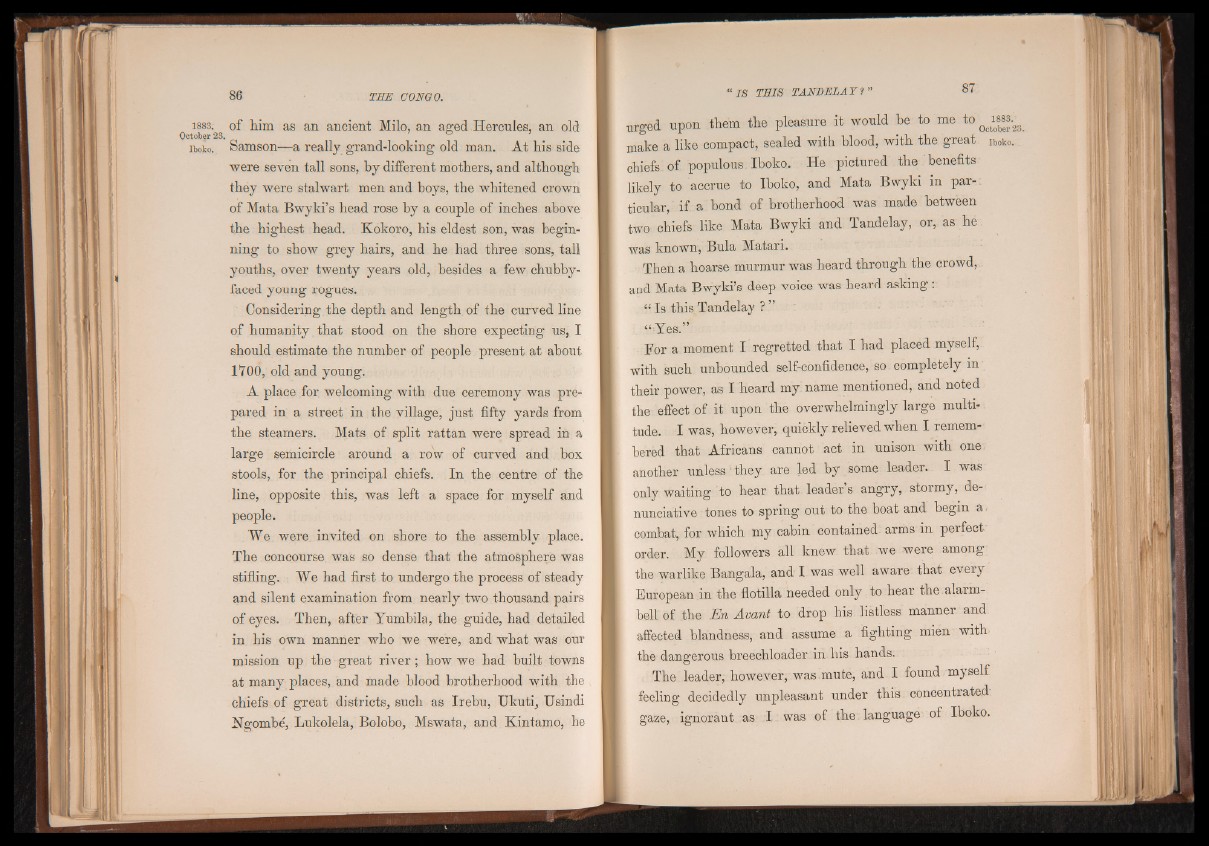
1883. of him as an ancient Milo, an aged Hercules, an old
October 23. . .
iboko. Samson—a really grand-looking old man. At his side
were seven tall sons, by different mothers, and although
they were stalwart men and hoys, the whitened crown
of Mata Bwyki’s head rose by a couple of inches above
the highest head. Kokoro, his eldest son, was beginning
to show grey hairs, and he had three sons, tall
youths, over twenty years old, besides a few chubby-
faced young rogues.
Considering the depth and length of the curved line
of humanity that stood on the shore expecting us, I
should estimate the number of people present at about
1700, old and young.
A place for welcoming with due ceremony was prepared
in a street in the village, just fifty yards from
the steamers. Mats of split rattan were spread in a
large semicircle around a row of curved and box
stools, for the principal chiefs. In the centre of the
line, opposite this, was left a space for myself and
people.
We were invited on shore to the assembly place.
The concourse was so dense that the atmosphere was
stifling. We had first to undergo the process of steady
and silent examination from nearly two thousand pairs
of eyes. Then, after Yumbila, the guide, had detailed
in his own manner who we were, and what was our
mission up the great riv e r; how we had built towns
at many places, and made blood brotherhood with the
chiefs of great districts, such as Irebu, Ukuti, Usindi
Ngombe, Lukolela, Bolobo, Mswata, and Kintamo, he
urged upon them the pleasure it would be to me to ^1883
make a like compact, sealed with blood, with the great iboko
chiefs: of populous. Iboko. He pictured the benefits
likely to accrue to Iboko, and Mata Bwyki in par-,
ticular, if a bond of brotherhood was made between
two chiefs like Mata Bwyki and Tandelay, or, as he
was known, Bula Matari.
Then a hoarse murmur was heard through the crowd,
and Mata Bwyki’s deep voice was heard asking ft
“ Is this Tandelay ? ”
“Yes.”
For a moment I regretted that I had placed myself,
with such unbounded self-confidence, so . completely m;
their power, as I heard my name mentioned, and noted
the effect of it upon the overwhelmingly large multitude.
I was, however, quickly relieved when I remembered
that Africans cannot act in unison with one:
another unless ‘ they are led by some leader. I was
only waiting to hear that leader’s angry, stormy, denunciative
: tones to spring out to the boat and begin a .
combat, for which my cabin contained, arms in perfect
order. My followers all knew that we were among
the warlike Bangala, and I was well aware that every
European in the flotilla needed only to hear the alarm-
bell of the En Avant to drop his. listless manner and
affected blandness, and assume a fighting mien with
the dangerous breechloader : in his hands.
The leader, however, was.mute, and I found myself
feeling decidedly unpleasant under this, concentrated
gaze, ignorant as I . was of the language of Iboko.